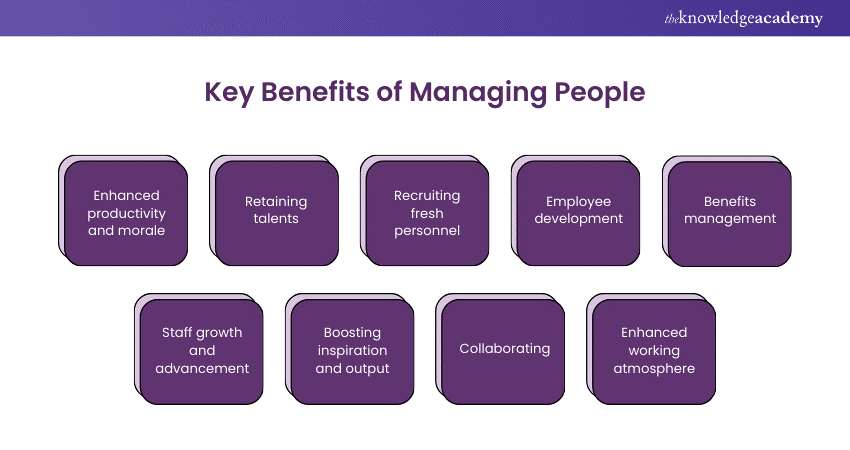We may not have the course you’re looking for. If you enquire or give us a call on 01344203999 and speak to our training experts, we may still be able to help with your training requirements.
We ensure quality, budget-alignment, and timely delivery by our expert instructors.

Organisational efficiency often depends on the quality of People Management, which can enhance efficiency indicators like productivity, sense of belongingness, and overall performance. There are numerous Benefits of Managing People, which organisations can easily maintain by looking after the welfare of the employees.
From employee attraction and retention to driving collaborative and innovative efforts, People Management leaders help a business grow, profit, and sustain. This blog will discuss how good People Management can result in a positive workplace, a strategic direction, and a competitive edge.
Table of Contents
1) Key Benefits of Managing People
a) Enhanced productivity and morale
b) Finding and keeping talent
c) Recruiting fresh personnel
d) Employee development
e) Benefits management
f) Staff growth and advancement
g) Boosting inspiration and output
h) Collaborating
i) Enhanced working atmosphere
2) The foundations of People Management
3) Conclusion
Key Benefits of Managing People
Managing people effectively is crucial for the success and sustainability of any organisation. By applying effective strategies for managing people and leadership, businesses can achieve significant advantages. Here are some key benefits and how they contribute to organisational success:

1) Enhanced productivity and morale
Well-managed personnel result in a higher average workplace productivity and better employee attitudes. Managers who prioritise open communication, do check-ins and appreciate efforts motivate their employees to give their best and perform unwaveringly, thus meeting the organisational requirements.
A workplace with a synergy of positive attitudes leads to motivated, committed, and job-satisfied people, which raises productivity and cuts down turnover rates.
2) Retaining talents
A critical factor that governs the performance of an organisation is the recruitment and retention of talent. To get the best of People Management, we must select the best with a sound recruitment system, competitive compensation, and the employer's brand attracting candidates.
Organisations can use strategies such as creating career progression opportunities, granting helpful work experience and a continuous learning culture, retaining skilled employees, and managing talent shortages.
3) Recruiting fresh personnel
Effective staff management covers recruiting and enlisting capable personnel necessary for ongoing growth and aim attainment. Efficient recruitment procedures in the workplace include:
a) Finding a talent gap.
b) Defining job profiles and roles.
c) Using varied recruiting channels to attract diverse candidates.
Examining candidates by interviewing with them, looking at the culture fit, and having a thorough onboarding program is how organisations can integrate new hires smoothly and effectively as a team.
4) Employee development
Employee development is an investment in upgrading job performance and skills and increasing job satisfaction. An increase in skilled employees leads to increased productivity and better services delivered. This focus on development is a key responsibility outlined in a People Manager Job Description. In People Management, you will aspire to discover prevailing career needs, offer training, and introduce mentorship and coaching modules.
By identifying development plans, Employees can become professionally related by flourishing as an individual entity and contributing effectively as a team towards fulfilling the company goals for continuous improvement and development.
5) Benefits management
Human resource managers organise all the stages, creating the initial plans, implementing them, and then administering benefit programmes that provide for healthcare, retirement, and wellness. Through generously providing different perks to cater to a diverse workforce, organisations achieve satisfaction, employee loyalty, and better work experience.
6) Staff growth and advancement
Establishing professional growth and upward mobility for staff members are significant aspects of employee engagement and continued organisational success. Human resources managers will highlight service users with high potential for growth, provide ample opportunities for knowledge and career advancement, and design paths for in-house mobility. When considering the Advantages and Disadvantages of In-House Training, this approach ensures that employees have a clear career development plan, which boosts retention and morale, while also fostering a more skilled, versatile workforce within the organisation.
Through assignments of varying levels of difficulty, rotational programs, and succession planning schemes, the companies will provide for the development of staff and talent retention and, hence, the development of the talent pipeline.
7) Boosting inspiration and output
Successful staff management encourages people to go beyond themselves and be proud of their achievements and contributions toward organisational goals. Through expressions of support and trust and granting autonomy and managerial powers, managers can cause team members to turn those spaces into creative playgrounds, sources of innovative ideas, and develop initiatives.
Identification and acknowledgement of accomplishments and support of a sense of purpose encourage employees to aim for outstanding performance and achieve praiseworthy goals. Recognition of teamwork underlines the role of including the team as a whole in the company mission.
8) Collaborating
Fostering collaboration and teamwork is the foundation for achieving synergy and organisational success. The role of a people manager is to ensure adequate communication while barriers are being overcome. Promoting knowledge sharing across all teams and encouraging people to work in teams is an integral part of the culture.
Through a culture that fosters collaboration, the incorporation of diverse ideas and skills, and the establishment of an atmosphere of inclusivity and respect, organisations will be positioned to maximise their collective capacity, resulting in faster and more effective achievement of common objectives.
9) Enhanced working atmosphere
Developing a positive and diversified workplace is an essential element of staff happiness, involvement, and retention. People managers focus on building trust, which forms a culture of transparency and open communication, by embracing team members who are accepted, appreciated, and empowered to come through for the company.
Organisations develop a caring and welcoming atmosphere where employees do not stress out to cope but instead make better contributions by promoting work-life balance, offering flexibility, and keenly intervening in any possible workplace injustices.
Are you interested to develop the ability to lead and Manage People? Then register now for our Management Courses!
The foundations of People Management
Let's have a more in-depth look at the foundations of People Management:
1) Interaction
Efficient People Management starts with building communication based on support between managers and employees, a process that can be enhanced with the use of People Management Software. Establishing communication channels, regular feedback, and active listening create a favourable environment in which concerns are resolved, ideas are shared, and relations are grown.
2) Motivation
Employee engagement is fundamental when it comes to employee motivation. As people managers, leaders motivate employees by recognising their achievements, providing growth opportunities, setting up an environment linked to organisational goals, and stimulating the feeling of value and devotion. One of the Ways to Motivate Employees is by creating a workplace where employees feel both challenged and supported, fostering a culture of continuous development and recognition.
3) Knowledge and development
Training and development of the workers are essential to unleashing the power of the human capital and boosting performance. When people managers endeavour to provide learning opportunities, conduct training programs, and mentor employees to sharpen skills, improve expertise, and increase self-esteem, they enable them to reach their potential and play an active role in the organisation.
4) Collaboration
Fostering collaboration and teamwork is the key to accomplishing harmony and discovering new ideas. People managers improve collaboration by cultivating a culture of confidence, respect, and inclusion, eliminating barriers between departments, and promoting knowledge-sharing and problem-solving collectively with teams. This eventually leads to better organisational performance.
Get ready for your next role with top People Management Interview Questions. Explore expert insights and ace your interview with confidence!
Conclusion
We hope this blog explains what organisations can obtain from the numerous Benefits of Managing People. Organisations can achieve high performance and sustainable growth by looking after the employees' well-being and fostering a work culture where their development is crucial.
Improve your time management skills and productivity with our Productivity and Time Management Training!
Frequently Asked Questions
What is the biggest challenge in managing people?

The biggest challenge in managing people is effectively balancing the diverse needs, personalities, and expectations of individuals within a team.
How can managing people help to promote employee satisfaction?

Managing people effectively involves prioritising employee well-being, providing opportunities for growth and development, recognising achievements, and fostering a positive work environment.
What are the other resources and offers provided by The Knowledge Academy?

The Knowledge Academy takes global learning to new heights, offering over 3,000 online courses across 490+ locations in 190+ countries. This expansive reach ensures accessibility and convenience for learners worldwide.
Alongside our diverse Online Course Catalogue, encompassing 19 major categories, we go the extra mile by providing a plethora of free educational Online Resources like News updates, Blogs, videos, webinars, and interview questions. Tailoring learning experiences further, professionals can maximise value with customisable Course Bundles of TKA.
What is Knowledge Pass, and how does it work?

The Knowledge Academy’s Knowledge Pass, a prepaid voucher, adds another layer of flexibility, allowing course bookings over a 12-month period. Join us on a journey where education knows no bounds.
What are related courses and blogs provided by The Knowledge Academy?

The Knowledge Academy offers various Management Courses, including Introduction To Managing People Course, Senior Management Training, and Productivity and Time Management Course. These courses cater to different skill levels, providing comprehensive insights into Management methodologies methodologies.
Our Business Skills blogs covers a range of topics related to Talent Acquisition, offering valuable resources, best practices, and industry insights. Whether you are a beginner or looking to advance your Human Resource skills, The Knowledge Academy's diverse courses and informative blogs have you covered.
Upcoming Business Skills Resources Batches & Dates
Date
 Introduction to Managing People
Introduction to Managing People
Fri 14th Mar 2025
Fri 9th May 2025
Fri 11th Jul 2025
Fri 12th Sep 2025
Fri 14th Nov 2025






 Top Rated Course
Top Rated Course



 If you wish to make any changes to your course, please
If you wish to make any changes to your course, please


